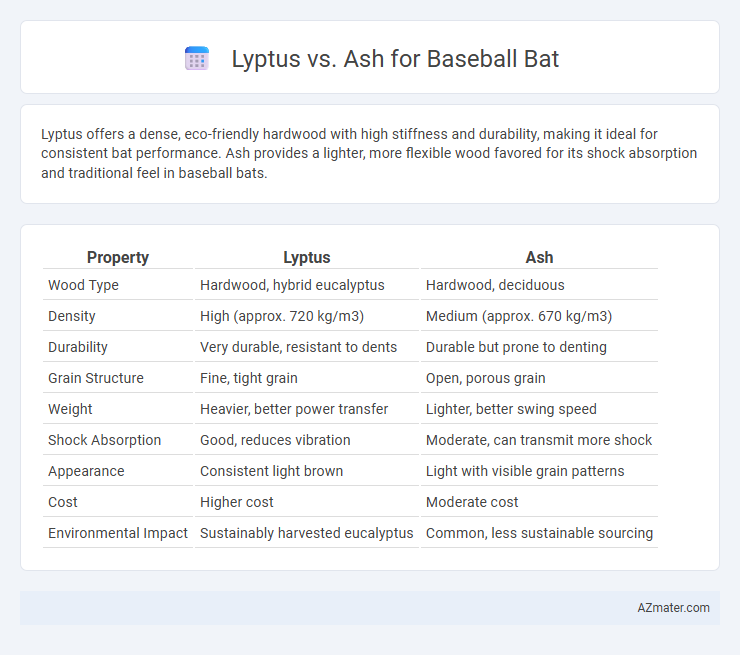Lyptus offers a dense, eco-friendly hardwood with high stiffness and durability, making it ideal for consistent bat performance. Ash provides a lighter, more flexible wood favored for its shock absorption and traditional feel in baseball bats.
Table of Comparison
| Property | Lyptus | Ash |
|---|---|---|
| Wood Type | Hardwood, hybrid eucalyptus | Hardwood, deciduous |
| Density | High (approx. 720 kg/m3) | Medium (approx. 670 kg/m3) |
| Durability | Very durable, resistant to dents | Durable but prone to denting |
| Grain Structure | Fine, tight grain | Open, porous grain |
| Weight | Heavier, better power transfer | Lighter, better swing speed |
| Shock Absorption | Good, reduces vibration | Moderate, can transmit more shock |
| Appearance | Consistent light brown | Light with visible grain patterns |
| Cost | Higher cost | Moderate cost |
| Environmental Impact | Sustainably harvested eucalyptus | Common, less sustainable sourcing |
Introduction to Lyptus and Ash Baseball Bats
Lyptus wood, a hybrid eucalyptus species, offers exceptional hardness and durability, making it a premium choice for baseball bats with a dense grain structure that provides consistent performance and increased resistance to cracks. Ash baseball bats are renowned for their lightweight feel and flexibility, featuring a porous grain that allows for better shock absorption and a larger hitting area, favored by many players for a balanced swing. Both Lyptus and Ash bats cater to different hitting styles, with Lyptus preferred for power hitters seeking strength and Ash ideal for players prioritizing control and bat speed.
Wood Origins and Sustainability
Lyptus wood, derived from a fast-growing hybrid of Eucalyptus species native to South America, offers a sustainable option for baseball bats due to its rapid renewability and responsible plantation management. Ash, primarily sourced from North American hardwood forests, is traditional in bat production but faces sustainability concerns linked to slow growth rates and increasing habitat loss. Choosing Lyptus supports eco-friendly practices with certified reforestation efforts, while Ash provides superior flexibility and durability rooted in centuries-old timber harvesting practices.
Hardness and Durability Comparison
Lyptus wood features a Janka hardness rating of approximately 1,320, making it denser and harder than ash, which typically rates around 1,200. This increased hardness contributes to Lyptus's superior resistance to dents and wear during intense gameplay. Ash, while slightly softer, offers excellent flexibility and shock absorption, but Lyptus outperforms ash in long-term durability and impact resistance for baseball bats.
Weight and Balance Differences
Lyptus baseball bats are generally lighter than ash bats, offering enhanced swing speed and better control for players seeking quick bat acceleration. Ash bats provide a traditional feel with slightly heavier weight and more pronounced barrel-end balance, resulting in powerful hits and improved feedback on ball contact. The difference in weight and balance between Lyptus and ash impacts swing mechanics, making Lyptus ideal for contact hitters and ash preferable for power hitters.
Power and Performance on the Field
Lyptus wood offers greater density and hardness compared to Ash, providing enhanced power and durability for baseball bats. Ash bats deliver superior flex and lightweight control, translating to faster swing speeds and better performance in contact precision. Choosing between Lyptus and Ash depends on whether the player prioritizes raw power or balanced performance during gameplay.
Shock Absorption and Vibration Feedback
Lyptus wood offers superior shock absorption compared to ash, making it a preferred choice for players seeking reduced hand fatigue during baseball batting. Its dense cellular structure effectively dampens vibration feedback, providing a smoother feel upon ball contact. In contrast, ash bats tend to transmit more vibrations to the hands, which can lead to increased discomfort and impact sensitivity.
Grain Structure and Aesthetic Appeal
Lyptus baseball bats feature a denser, straighter grain structure due to their hybrid hardwood composition, offering enhanced durability and consistent performance. Ash bats showcase an open grain pattern that provides flexible shock absorption and a classic, natural wood aesthetic sought after by traditional players. The light color and striking grain lines of ash create a visually appealing bat, while Lyptus presents a uniform, reddish hue with a smooth finish for a modern, sleek look.
Cost and Availability
Lyptus wood, a hybrid eucalyptus species, offers a cost-effective alternative to traditional hardwoods and is widely available due to its fast-growing nature and sustainable cultivation, making it popular for baseball bats. Ash, prized for its lightweight and flexible qualities, tends to be more expensive and less readily available because of decreasing supply and increased demand within the sporting goods industry. Cost-wise, Lyptus bats often come at a lower price point, while ash bats, benefiting from legacy status and performance reputation, may carry a premium in both amateur and professional markets.
Player Preferences and Professional Usage
Lyptus wood offers a lightweight yet durable option favored by players seeking enhanced swing speed and control, making it popular among youth and amateur baseball players who prioritize agility. Ash baseball bats provide a traditional balance of flexibility and strength, preferred by many professional and veteran players for its ability to deliver powerful hits and consistent performance. Professional usage often leans toward ash for its well-documented responsiveness, though lyptus is gaining traction due to its sustainability and comparable performance characteristics.
Conclusion: Choosing the Right Bat Material
Lyptus offers a lightweight, durable option with a smooth grain structure, ideal for players prioritizing swing speed and control, while Ash provides a traditional, flexible feel with excellent shock absorption, preferred for its natural hitting feedback. Selecting the right bat material depends on individual playing style and priorities: Lyptus suits power hitters seeking quick swings, whereas Ash is favored by players who value a balanced combination of strength and flexibility. Evaluating factors like durability, weight distribution, and impact response ensures optimal performance tailored to each baseball player's needs.

Infographic: Lyptus vs Ash for Baseball Bat
 azmater.com
azmater.com